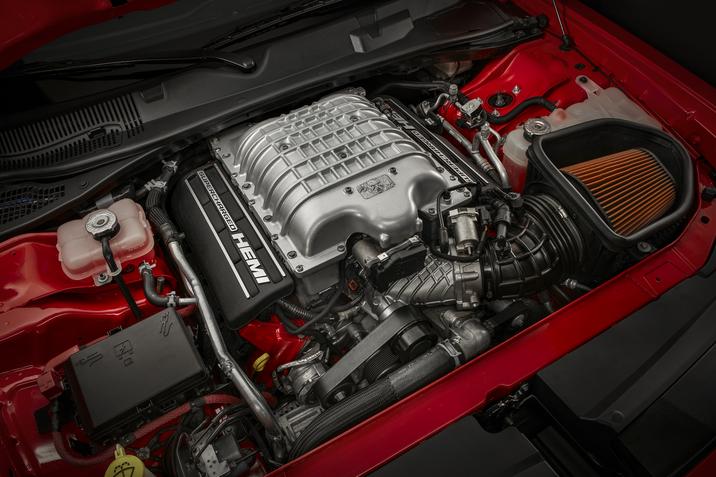FCA Faces $79 Million Fine Over U.S. Fuel Economy Shortfall

Fiat Chrysler Automobiles is facing a $79 million civil penalty over its inability to adhere to fuel economy requirements in 2017. Considering the automaker was already hit with a $77 million fine for 2016 model year requirements, the announcement is not unexpected. FCA’s domestic lineup is also loaded with large vehicles featuring sizable motors, a status quo it hopes to offset by buying carbon credits from Tesla.
In fact, the company appears to be taking a wait-and-see approach in regard to pursuing greener automobiles. While it continues to maintain its $10 billion commitment through 2022, aimed at delivering more hybrid and electric vehicles, the automaker’s established strategy involves eating whatever penalties it incurs via federal economy requirements or attempting to pay them off in advance.
Frankly, it might be a more cost-effective way to run the company — as it allows the automaker to continue leveraging older models (cough, Dodge). It’s not like people aren’t buying them… though perhaps not in the same numbers FCA originally claimed. The development of electric vehicles also requires quite a bit of cash, with little promise of recouping those funds through sales. Simply paying emission fines could give the company more time to fine-tune its hybrid and electric models while also minimizing the amount of money it has to invest during an uncertain period for the auto industry.
Then again, FCA could be strategizing itself into obsolescence by not pursuing electrification quite so aggressively as some of its rivals. However, plenty of them are also buying emission credits and taking it easier with electrification.
The Department of Transportation’s report came out on Tuesday, noting that Fiat Chrysler had failed to meet the standards set for 2017. While the report has since been taken down (likely temporarily), FCA confirmed it was notified, adding that it has 60 days to respond.
[Image: FCA]

A staunch consumer advocate tracking industry trends and regulation. Before joining TTAC, Matt spent a decade working for marketing and research firms based in NYC. Clients included several of the world’s largest automakers, global tire brands, and aftermarket part suppliers. Dissatisfied with the corporate world and resentful of having to wear suits everyday, he pivoted to writing about cars. Since then, that man has become an ardent supporter of the right-to-repair movement, been interviewed on the auto industry by national radio broadcasts, driven more rental cars than anyone ever should, participated in amateur rallying events, and received the requisite minimum training as sanctioned by the SCCA. Handy with a wrench, Matt grew up surrounded by Detroit auto workers and managed to get a pizza delivery job before he was legally eligible. He later found himself driving box trucks through Manhattan, guaranteeing future sympathy for actual truckers. He continues to conduct research pertaining to the automotive sector as an independent contractor and has since moved back to his native Michigan, closer to where the cars are born. A contrarian, Matt claims to prefer understeer — stating that front and all-wheel drive vehicles cater best to his driving style.
More by Matt Posky
Latest Car Reviews
Read moreLatest Product Reviews
Read moreRecent Comments
- ToolGuy Good for them, good for me.
- Tassos While I have been a very satisfied Accord Coupe and CIvic Hatch (both 5-speed) owner for decades (1994-2017 and 1991-2016 respectively), Honda has made a ton of errors later.Its EVs are GM clones. That alone is sufficient for them to sink like a stone. They will bleed billions, and will take them from the billions they make of the Civic, Accord, CRV and Pilot.Its other EVs will be overpriced as most Hondas, and few will buy them. I'd put my money on TOyota and his Hybrid and Plug-in strategy, until breaktrhus significantly improve EVs price and ease of use, so that anybody can have an EV as one's sole car.
- ToolGuy Good for Honda, good for Canada.Bad for Ohio, how could my President let this happen? lol
- Tassos A terrible bargain, as are all of Tim's finds, unless they can be had at 1/2 or 1/5th the asking price.For this fugly pig, I would not buy it at any price. My time is too valuable to flip ugly Mitsus.FOr those who know these models, is that silly spoiler in the trunk really functional? And is its size the best for optimizing performance? Really? Why do we never see a GTI or other "hot hatches' and poor man's M3s similarly fitted? Is the EVO trying to pose as a short and fat 70s ROadrunner?Beep beep!
- Carson D Even Tesla can't make money on EVs anymore. There are far too many being produced, and nowhere near enough people who will settle for one voluntarily. Command economies produce these results. Anyone who thinks that they're smarter than a free market at allocating resources has already revealed that they are not.


































Comments
Join the conversation
I see the trolls who love to identify with the world's worst people and companies have latched on to FCA. It's laughable because there's no strategy or politics to this situation. Chrysler is exactly the same company it has always been, generation after generation: the also-ran of the Detroit Three, milking obsolete platforms for the last penny, balancing its reputation for cheap interiors and poor reliability with a knack for carving out a niche with fun colors and cheap horsepower, often having good ideas but rarely having the money to develop them properly (behold the brilliant but unreliable Pacifica Hybrid, with its habit of becoming engulfed in flames), and somehow managing to come back from the brink every time through pluck or luck (K-cars, the SUV craze). No strategy here other than making it to next quarter in one piece, long term be damned.
This is simply a $79 million tax.